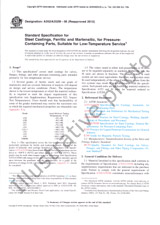We need your consent to use the individual data so that you can see information about your interests, among other things. Click "OK" to give your consent.
ASTM E2032-21
Standard Practice for Extension of Data From Fire Resistance Tests Conducted in Accordance with ASTM E 119
Translate name
STANDARD published on 15.12.2021
The information about the standard:
Designation standards: ASTM E2032-21
Publication date standards: 15.12.2021
SKU: NS-1048071
The number of pages: 10
Approximate weight : 30 g (0.07 lbs)
Country: American technical standard
Category: Technical standards ASTM
The category - similar standards:
Ignitability and burning behaviour of materials and products
Annotation of standard text ASTM E2032-21 :
Keywords:
building materials, concrete, fire, fire endurance, fire resistance rating, fire resistance, steel, wood,, ICS Number Code 13.220.40 (Ignitability and burning behaviour of materials and products)
Additional information
| Significance and Use | ||||||||||||||||
|
4.1?The methods and procedures set forth in this practice relate to the extension of the fire resistance ratings obtained from particular fire tested specimens to constructions that have not been tested. 4.2?Users of this practice must have knowledge and understanding of the provisions of Test Method E119 including those pertaining to conditions of acceptance. 4.3?In order to apply some of the principles described in this practice, reference to the original fire test report will be necessary. 4.4?In Test Method E119, the specimens are subjected to specific laboratory fire test exposure conditions. Substitution of different test conditions or changes in the end use conditions have the ability to change the measured fire-test-response characteristics. Therefore, the extensions of data are valid only for the fire test exposure conditions described in Test Method E119,. |
||||||||||||||||
| 1. Scope | ||||||||||||||||
|
1.1?This practice covers the extension of fire resistance ratings obtained from fire tests performed in accordance with Test Method E119 to constructions that have not been tested. Test Method E119 evaluates the duration for which test specimens will contain a fire, retain their standard integrity, or both during a predetermined test exposure. 1.2?This practice is based on principles involving the extension of test data using simple considerations. The acceptance of these principles and their application is based substantially on an analogous worst case proposition. 1.3?These principles are only applicable to temperature conditions represented by the standard time-temperature curve described in Test Method E119. Test Method E119 is a fire-test-response standard. 1.4?The types of building constructions which are the subject of this practice are categorized as follows: beams; floor and roof assemblies; columns; and walls and partitions. Floor and roof assemblies include such assemblies with ceiling protective membranes. 1.5?The extension of test data using numerical calculations based on empirical data or theoretical models is not covered in this practice. 1.6?This practice does not cover the substitution of one proprietary material for another proprietary material, or materials for which fire test data are not presently available. 1.7?This practice does not purport to be comprehensive in its treatment of non-proprietary modifications of tested constructions. Engineering evaluation or tests are recommended for assessing modifications not specifically covered in this practice. 1.8?The values stated in SI units are to be regarded as standard. The values given in parentheses after SI units are provided for information only and are not considered standard. 1.9?This standard is used to determine certain fire-test responses of materials, products, or assemblies to heat and flame under controlled conditions by using results obtained from fire-test-response standards. The results obtained from using this standard do not by themselves constitute measures of fire hazard or fire risk. 1.10?This standard does not purport to address all of the safety concerns, if any, associated with its use. It is the responsibility of the user of this standard to establish appropriate safety, health, and environmental practices and determine the applicability of regulatory limitations prior to use. 1.11?This international standard was developed in accordance with internationally recognized principles on standardization established in the Decision on Principles for the Development of International Standards, Guides and Recommendations issued by the World Trade Organization Technical Barriers to Trade (TBT) Committee. |
||||||||||||||||
| 2. Referenced Documents | ||||||||||||||||
|
We recommend:
Technical standards updating
Do you want to make sure you use only the valid technical standards?
We can offer you a solution which will provide you a monthly overview concerning the updating of standards which you use.
Would you like to know more? Look at this page.




 Cookies
Cookies
